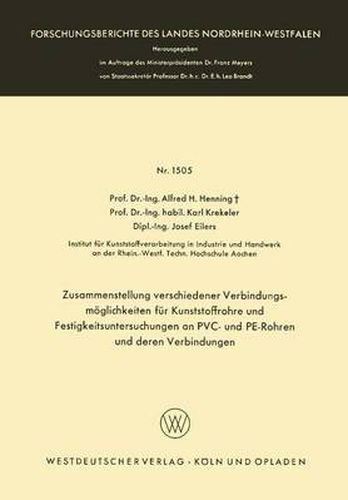Readings Newsletter
Become a Readings Member to make your shopping experience even easier.
Sign in or sign up for free!
You’re not far away from qualifying for FREE standard shipping within Australia
You’ve qualified for FREE standard shipping within Australia
The cart is loading…






This title is printed to order. This book may have been self-published. If so, we cannot guarantee the quality of the content. In the main most books will have gone through the editing process however some may not. We therefore suggest that you be aware of this before ordering this book. If in doubt check either the author or publisher’s details as we are unable to accept any returns unless they are faulty. Please contact us if you have any questions.
Die Kunststoffe haben infolge der grossen Variationsbreite ihrer Eigenschaften ein weites Anwendungsgebiet gefunden. Ein wichtiges, noch standig im Wachsen begriffenes Einsatzgebiet fur Kunststoffe ist der Rohrsektor. Der mengenmassige Anteil der Rohrproduktion an der gesamten Kunststofferzeugung geht aus der Tab. 1 hervor. Der Anteil der Kunststoffrohre ist in dem angegebenen Zeitraum von 1956 bis 1963 von 1100 t auf ca. 31 000 t angestiegen, wahrend die gesamte Kunststoffproduktion von 450 000 tauf 1 425 000 t gesteigert werden konnte. Das bedeutet, dass die Rohrproduktion 1956 rd. 0,2% und 1963 ca. 2% der gesamten Kunststofferzeugung betrug. Tab. 1 Entwicklung der Produktion von Kunststoffen insgesafJlf und von Kunststoffrohren in der Bundesrepublik Deutschland seit 1956 (nach Angaben des Statistischen Bundesamtes) Produktion von Kunststoffen insgesamt von Kunststoffrohren [in 1000 t] 1956 450 1,1 ca. ca. 1957 550 2,6 1958 620 5,3 1959 10,1 805 1960 985 14,3 1961 1070 19,2 1962 1248 25,0 1963 1425 31,0 Je nach Verwendungszweck kommen unter anderem folgende Kunststoffe fur die Herstellung von Rohren in Frage: Polyvinylchlorid hart (PVC hart), Polyvinylchlorid schlagfest (PVC schlagfest), Polyathylen hart und weich (PE hart und PE weich), Polypropylen (PP), Polyamide (PA), Polymethylmethacrylat (PMMA), Polyformaldehyd (POM), Cellulose-Acetobutyrat (CAB), mit Glasfasern verstarkte ungesattigte Polyester (GUP) und mit Glasfasern verstarkte Epoxydharze (GEP).
$9.00 standard shipping within Australia
FREE standard shipping within Australia for orders over $100.00
Express & International shipping calculated at checkout
This title is printed to order. This book may have been self-published. If so, we cannot guarantee the quality of the content. In the main most books will have gone through the editing process however some may not. We therefore suggest that you be aware of this before ordering this book. If in doubt check either the author or publisher’s details as we are unable to accept any returns unless they are faulty. Please contact us if you have any questions.
Die Kunststoffe haben infolge der grossen Variationsbreite ihrer Eigenschaften ein weites Anwendungsgebiet gefunden. Ein wichtiges, noch standig im Wachsen begriffenes Einsatzgebiet fur Kunststoffe ist der Rohrsektor. Der mengenmassige Anteil der Rohrproduktion an der gesamten Kunststofferzeugung geht aus der Tab. 1 hervor. Der Anteil der Kunststoffrohre ist in dem angegebenen Zeitraum von 1956 bis 1963 von 1100 t auf ca. 31 000 t angestiegen, wahrend die gesamte Kunststoffproduktion von 450 000 tauf 1 425 000 t gesteigert werden konnte. Das bedeutet, dass die Rohrproduktion 1956 rd. 0,2% und 1963 ca. 2% der gesamten Kunststofferzeugung betrug. Tab. 1 Entwicklung der Produktion von Kunststoffen insgesafJlf und von Kunststoffrohren in der Bundesrepublik Deutschland seit 1956 (nach Angaben des Statistischen Bundesamtes) Produktion von Kunststoffen insgesamt von Kunststoffrohren [in 1000 t] 1956 450 1,1 ca. ca. 1957 550 2,6 1958 620 5,3 1959 10,1 805 1960 985 14,3 1961 1070 19,2 1962 1248 25,0 1963 1425 31,0 Je nach Verwendungszweck kommen unter anderem folgende Kunststoffe fur die Herstellung von Rohren in Frage: Polyvinylchlorid hart (PVC hart), Polyvinylchlorid schlagfest (PVC schlagfest), Polyathylen hart und weich (PE hart und PE weich), Polypropylen (PP), Polyamide (PA), Polymethylmethacrylat (PMMA), Polyformaldehyd (POM), Cellulose-Acetobutyrat (CAB), mit Glasfasern verstarkte ungesattigte Polyester (GUP) und mit Glasfasern verstarkte Epoxydharze (GEP).